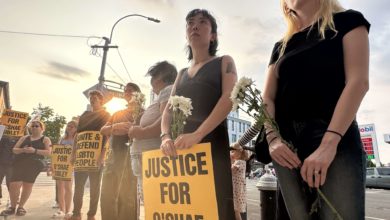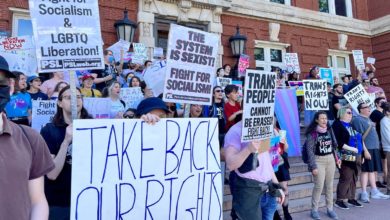The following article appeared Mar. 2 on pslweb.org.

In February 2007, John Amaechi became the first male professional basketball player to publicly announce that he is gay. He joins just a handful of out professional athletes.
Amaechi, who retired from the NBA in 2003, described his NBA experiences in a recent autobiography, including having to endure anti-gay innuendos from a former coach and hiding his homosexuality from other players and teammates.
Many players and some coaches were supportive following Amaechi’s announcement. The responses of other players reflected the bigotry and sexism so common in professional sports.
One player said that he did not care about another player’s sexual orientation as long as he did not bring his “gayness on me” or “make any advances toward me.” Another player said that Amaechi had violated the trust of the locker room by keeping his sexual orientation to himself.
These are versions of the anti-gay stereotypes of the gay man as a sexual predator and the “brotherhood” of straight males.
Struggle beyond the NBA
For gay athletes, macho stereotypes lead to the perception that they are incapable of succeeding in a physical environment.
But the hard-fought struggle against anti-gay bigotry goes far beyond professional sports. It affects the entire working class.
It is this broader activist movement against anti-gay bigotry and for social justice that forced the NBA to react harshly to the most bigoted of responses to Amaechi’s announcement.
In a radio interview, former NBA player Tim Hardaway stated that he “hates gay people,” and that “[Homosexuality] shouldn’t be in the world or in the United States.”
The NBA was forced to ban Hardaway from appearing at NBA events during All-Star weekend. Without the broader people’s movement against anti-gay bigotry, the NBA and other capitalist entities would not have had to disavow these remarks.
Amaechi has also spoken publicly about the use of racism and anti-gay bigotry to foment divisions between people. In an appearance on HBO, he stressed the importance of solidarity between oppressed communities, such as the African American and wider gay communities.
Sports, like everything else in U.S. capitalist society, are treated by the rulings class as a commodity. From the earliest ages, children who participate in sports, particularly boys, hear sexist, racist and homophobic taunts aimed to make them perform better.
“Are you man enough?” “Do not throw/act like a girl!” These are some of the bigoted challenges used to coerce male athletes into working harder.
By coming out, Amaechi has helped challenge stereotypes but has also drawn attention to the larger struggles that affect the working class in general.
Women athletes face sexism, bigotry
The mass publicity surrounding Amaechi’s announcement contrasts with the media coverage when WNBA star Sheryl Swoopes came out in 2005.
While Amaechi came out after retirement and was not a star player, Swoopes came out while still playing and is one of the most successful female basketball players ever. She is probably the most high-profile professional athlete to come out.
Following her announcement, much of the media coverage was sexist and bigoted and aimed at marginalizing professional women athletes.
Stories debated whether this event was even newsworthy, claiming that it is unsurprising, due to the assumption that most, if not all, woman athletes are lesbians. Other stories used the sexist argument that since men’s professional sports are a larger industry compared to women’s, Swoopes’s announcement definitely was not newsworthy.
The experiences of Amaechi and Swoopes are examples of the bigotry and sexism that the ruling class uses to oppress and divide the working class. The massive sports industry propagates macho male images and aims to marginalize powerful female images, leading to more oppression of women and lesbian, gay, bisexual and transgender people.
This sexism and bigotry ultimately is used to derive increased profits from workers by oppressing women and LGBT people, and sowing divisions within the working class. To strengthen the entire working class movement it is important to challenge racism, sexism and bigotry wherever it appears, whether it is on the community basketball court, in the school gym or in the capitalist media and professional sports industry.
John Amaechi, formerly of the Orlando Magic, in 2001
Photo: Gary Bogdon






